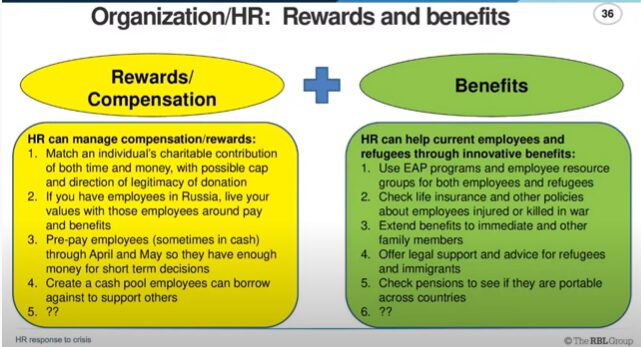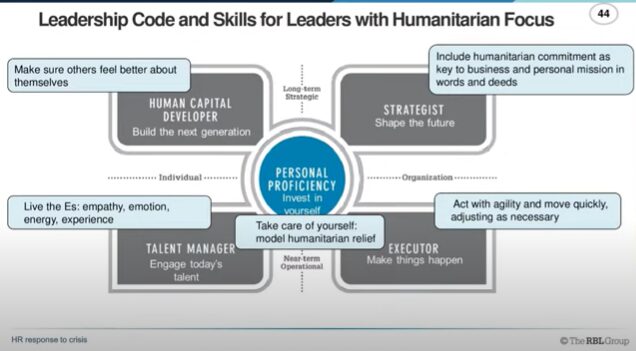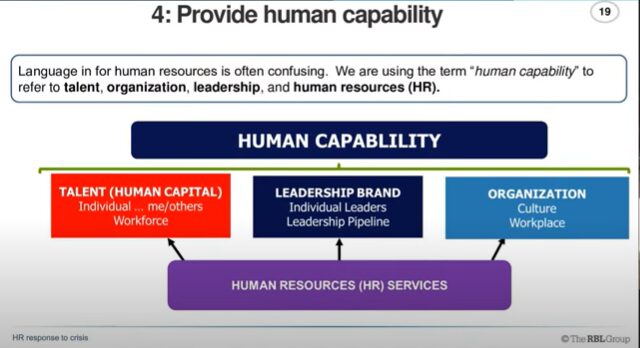
The most important thing HR can give to employees – in good times or bad
today2022.04.05. 2530 5


Farai Mugabe, Content & Research, The HR Congress
WHY SHOULD YOU CARE?
As organizations face the challenges of humanitarian crises, HR professionals should come together and support employees.
The world faces a myriad of socio-economic challenges which has become a threat to humanity. As the world recovers from the devastating effects of the COVID pandemic, Europe finds itself gripped with a war in Ukraine. In such a difficult scenario, Human Resources is expected to rise and lead organisations through the current humanitarian crises and beyond.
So what is the most important thing HR can give to employees, especially in times of crisis?
In a webinar hosted by the HR congress on the 17th of March 2022, Professor Dave Ulrich indicated that, good times or bad, “The best thing we as HR professionals can give our employees, is an organisation that succeeds in the marketplace. Because unless we succeed in the marketplace there is no workplace.”1 Professor Dave Ulrich offered a sustainable means for organisations to deal with the crises. He clearly explained how HR can align the people agenda with the organisational wide agenda. For organisations to survive the storm, they should walk together with their people.
HR’s contribution to the Humanitarian Crises
HR’s contribution to Humanitarian crises is based on developing ideas that have an impact on the organisation. In response to the worldwide humanitarian crises, HR professionals are strategically positioned to use their skills and competencies to create a workplace human capability agenda premised on the following:
Individual employees: Taking care of themselves and employees
Organisation: Using HR to offer organisational support
Leadership: Helping business and respond to global change
There are other ways in which HR can develop the right organisation that wins in the marketplace include creating the right culture, building the right organisation, communicate the right messages, building teamwork and manage rewards and benefits.
Focus on creating a governance system out of the crises
In the process of rising and leading through this current humanitarian crises and beyond, HR should develop a clear set of policies, procedures and crises management committees that work. These systems will ensure that the organisation has accountability and focus in dealing with current pressures being pushed from the external environment.
Creating the right culture
HR should create a culture that cares and will leading to a company to be more competitive. When HR leaders sits with other business leaders, it should discuss about create a conducive work culture that cares for its employees, investors, customers, suppliers and other key stakeholders. In the same process such a culture should help the organisation to win in the marketplace. It should help business organisations to be more profitable, adopt new technology, retain customers and develop new products and services.

Building team work
When HR develops teams such as crises management committees, it should ensure that the teams are well committed to the organisational cause. The crises management teams should be cross functional with members drawn from organisational functions such as finance, marketing, technology and operations. The teams should be empowered to make decisions.
Building the right organisation
In this time of crises, HR creates the right organisation through people practices. In this manner HR can help source new employees by creating a website and platform to register jobs for refugees, remove paperwork for hiring, create flexible working arrangements and redirect not reject refugees who fail to get jobs internally. HR can refer refugees to other companies or keep the employees as part of its talent pool. HR can develop current employees with the relevant skills and competencies such as being compassionate, language and mental health. These are critical skills to navigate this humanitarian crises.

Managing rewards and benefits
Navigating the current humanitarian challenges requires HR to revisit their rewards and benefits so that they are aligned with the current environmental changes.2 During times of crises, HR should help in managing rewards and benefits in a humanitarian manner. HR can pay employees in areas affected with war on time and offer salary advances to them so that they can handle the crises better. HR can also create a cash pool where employees can borrow to support others or develop any form of Employee Assistance programs.

Managing communication
Communication is critical during times of a humanitarian crises. HR should help to send the right message of hope and emotional support. Good communication helps to prevent panic and gives people the strength to move forward. 3
Build leadership
Leadership is a critical element in moving through the crises. Leadership provides direction to people on how to move. During the crises HR can lead discussions and the process. HR plays the role of a ‘human capital developer’ who develops leadership. In any crises, leadership has four key roles:
- Human capital developer
- Strategist
- Talent Manager
- Executor

Companies are where there are because of the capabilities of their people. In the process of building human capability, HR should focus on the following:
- Talent
- Leadership brand
- Organisation

Conclusion
The world has problems and HR needs to partner with organisations to help manage the crises. HR should rise and help companies manage this humanitarian crises that the world faces.
1RISE! How HR can Lead the Organization Through the current humanitarian crisis, by HR Congress
2Rethinking total rewards for the post-COVID era, by Sabrin Chowdhury, Neel Gandhi and Alex Katen-Narvell
3Communication in a post-Covid era: What 2020 has taught us about how to communicate better, by Open Mic, The Drum
4Dave Ulrich: 5 HR competencies (and actions) to enable renewal through human capability, by Dave Ulrich, HRD connect
Written by: Mihaly Nagy
Culture HR Strategy Leadership UKRAINE Wellbeing
Previous post

- 2692
labelArticles today2022.04.05.
HR at the hub of driving Digital Employee Experience (DEX) in an evolving workplace
Farai Mugabe, Content & Research, The HR Congress WHY SHOULD YOU CARE?As a result of the pandemic, digital transformation was forced on companies and DEX became a critical part of [...]
Similar posts

labelArticles today2024.07.24.
AI-Powered HR: Strategic Benefits and Practical Applications

labelArticles today2024.06.24.








Post comments (0)